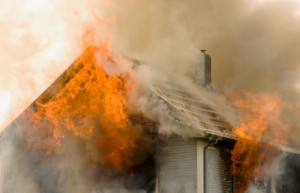Household fires are devastating. Here is some information about fires that speak volumes about their prevalence. According to the National Fire Protection Association, in 2013 there were over 1,240,000 fires in the United States. Almost a third of those fires were structure fires. Every 85 seconds a house fire was reported. $11.5 billion was reported in property damage as a direct result of fires.
While Blue Sky Chimney Sweeps knows all about keeping our customers safe from chimney and fireplace and venting related fires, unfortunately there are other causes of household fires. According to Reader’s Digest the most common causes of household fires include:
- Cooking Equipment such as a pan overheating or paper products too close to a heating source
- Heating Equipment including chimneys, fireplaces, and portable heaters
- Careless Smoking caused by smokers falling asleep while smoking or misplaced cigarettes
- Electrical Appliances with frayed cords, overloaded outlets, wires and electrical cords under carpeting or rugs, and misuse of extension cords
- Candles left unsecured in proper holders, unattended, or too close to furniture or drapery
Children playing with fire, improper wiring, flammable liquids, and Christmas trees and holiday decorations add to the fire risks in your home. The sad truth is, many homeowners don’t pay attention to these risks and suffer the consequences. The good news is many of these risks can be mitigated with proper attention.
In older homes, the wood frames and roofs dry out and make homes highly flammable. As reported in the Coast Reporter, Fire Chief Bob Stevens commented on a fire in Bonniebrook Heights in January 2015, “After many years the wood dries out and becomes just like tinder.” Jacob Roberts, staff reporter for the Coastal Reporter added, “Stevens said investigation into the actual cause is still ongoing, but it does not appear to be a chimney fire, as in not a result of buildup (from) combustible substances inside the chimney, like creosote. Firefighters are confident that it started where the chimney actually broke through the roof of the house, at the transition point.”
Characteristics of Fires
- Fires spread fast-it takes less than 30 seconds for a small fires to spread and become out of control
- Fires are hot-heat ranges from 100 degrees at the floor at 600 degrees at the ceiling which burns skin and internal organs when you breathe
- Fires are dark-they will leave you disoriented you and destroy your electrical lighting
- Fire is deadly-the heat, smoke, and toxic fumes are the triple threat to people and animals
To learn more about the characteristics of fire, and the Federal Emergency Management Agency (FEMA) click here.
Keeping You Safe
The American Red Cross has started an initiative to keep homeowners safe if a fire does occur in their homes. Smoke alarms and fire drills are the two necessities that all home owners must practice in order to prevent being a fire statistic. You can test your knowledge about fire safety by taking a simple quiz to learn your strengths and weakness when it comes to the safety of you and your family, click here.
Each season presents its own share of fire risks. Never ever use unapproved heating devices to heat your home. Gas and charcoal grills, generators, or kitchen stoves should never be used indoors as heating units. In the summertime, be sure bonfires, grills, and fireworks are far from homes, barns, garages and anything or place that can catch fire. Burning wood or leaves also presents great fire risks if not done in a confined area and under strict supervision. And of course, it is important to do regular inspections of the contents in your home to ensure all flammables are stored safely, electrical systems and cords are approved and up to code, and lightening protection devices are in place.
Smoke alarms are a must! Also, make sure you and your friends, neighbors, and family members have functioning batteries in the detectors and they are placed in strategic locations throughout their homes.

